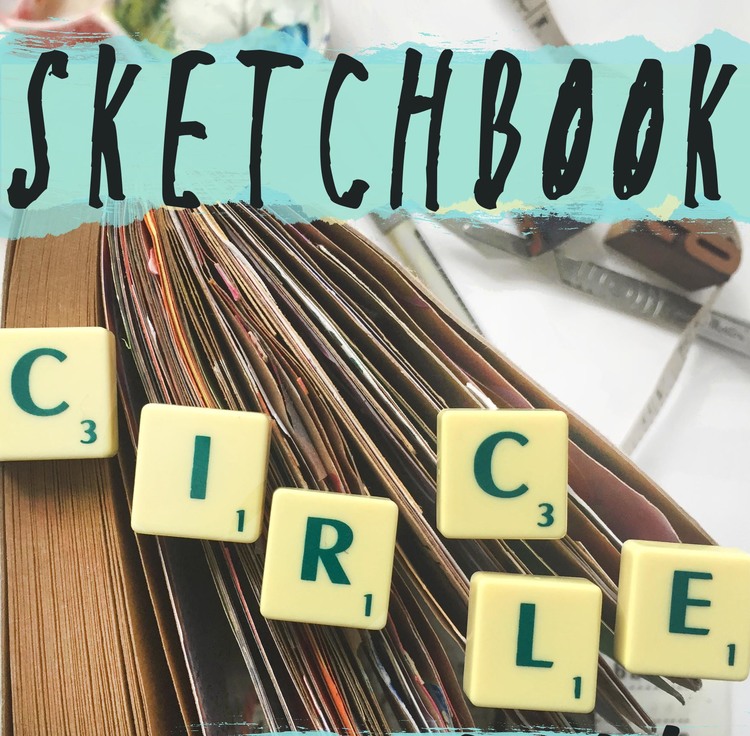Please introduce yourself
My name is Suzanne Chalke and I’ve been teaching since 2003, 7 of these years being Head of Department at Hinchleywood school.
This is my 4th year taking part in the sketchbook circle and my experience is getting better and better. I initially joined up after attending an NSEAD conference and loved the idea of doing something for myself, sharing a book with a neighbour and creating collaborative work. As Head of Department we get more and more swamped with paperwork and deadlines, I felt I had lost my own creative identity. A Sketchbook Circle seemed to me to be the best way of kick-starting my own work and discover what I enjoyed creating and making, it’s most definitely succeeded.
Tell us about your work
It’s taken a few sketchbooks for me to finally rediscover a style of work that I would call ‘me’. My degree was in 2D design - surface pattern, printmaking, textile design, photography and graphics. I would say that I’m still very much in this area and continue to enjoy combing these techniques. At present I am focusing on combining mundane everyday images such as drain covers and road markings with collage, gelli printing and mono printing. I like not being too set in what I do but instead experiment with different colours, layers, stencils and shapes then see where it takes me. I then start playing around with collage, composition and doodling on top. This has taken quite a few years to get to the point of being able to ‘go with the flow’ rather than being worried about ruining a page or getting bogged down in detail and the finished result.
What creative project are you currently working on?
Apart from taking part in this year’s sketchbook circle I have recently started an evening class in ceramics. I have never made clay work before and am enjoying learning new skills and understanding more about the technical side.
At school, we have recently been successful in our bid for a printing press so I am very much looking forward to further developing this area of my practice.
How does your creative process work?
My process either starts with an image and goes from there or it could be techniques based.
With my print making I will often use quite graphic images but I also like to create more abstract prints based of colours, shapes and line. Sometimes I will create my artwork in a free at school, procrastinating, and continue when I have my A level group. I feel it’s important that students see their teachers creating their own work, have a dialogue about what I’m doing and share ideas. Quite often they have helped me with my sketchbook circles, 2 heads are better than one.
What tools or materials could you not live without?
I couldn’t live without my pens, camera and paper. Taking photos is important to me, to be able to capture a colour, texture or shape. To have a moment where something has stopped you in your location and being able to capture it. I also love a bit of doodling as it helps me to stop my head from over thinking, just zoning out and not worrying what you are drawing.
Where do you search for creative inspiration?
For my inspiration, I tend to keep my eyes open when I’m walking about and pay attention to small details that others may miss such as textures on a wall, shapes of shadows on the ground, the pattern in an electrical pylon or the painted lines on a road. I enjoy looking at the mundane of everyday and just being aware of it. Since focusing more on this ideas pop into my head as I’m going to the local shops and then I’ll know what I’m going to create.
I also use Pinterest a lot, for school and for myself.
Being part of the sketchbook circle has inspired me hugely as I’ve leant new skills in workshops, seen so many good ideas in the Facebook group and from the partners I have had over the 4 years. I have often had to step out of my comfort zone to respond to a partner’s work.
What's the best piece of creative advice you have been given?
I’m not sure if there has been any specific advice but a collective. I would say it was just to get on with it, start it, not to procrastinate and trust that you are good at what you do. To take some risks and experiment and have fun, see what happens. I try to instill this in my students to varying degrees of success, some relish it and others not so. I believe it all boils down to what Matisse said, that ‘creativity takes courage’.






